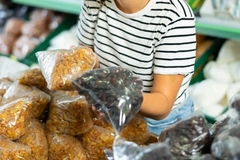Coca-Cola to revise “100% recycled plastic bottle” claims following EU pressure
Coca-Cola is updating its “100% recycled plastic” bottle claim in the EU after pressure from consumer protection authorities, who argue the statement is “misleading” and overstates the bottles’ environmental sustainability.
The current claim states that the bottles are made from “100% recycled plastic,” but following pressure from the EU consumer protection authorities, the beverage giant is now changing the statement to “I’m a bottle, excluding label and cap, made from 100% / 50% recycled plastic.”
“The commitments we’ve voluntarily aligned with the European Commission (EC) Consumer Protection Cooperation Network (CPC) underline our shared ambition of providing clear and factual information about our products to consumers,” a Coca-Cola spokesperson tells Packaging Insights.
“We will be implementing these changes in the coming months and will continue to develop our approach as the needs of our consumers evolve.”

Coca-Cola maintains that its current packaging already acknowledges that the recycling statement refers to the body of the bottle, excluding the label and cap, while asserting its commitment to collaborate with EU consumer protection authorities.
A spokesperson for the EC tells us, “National consumer protection authorities will monitor the implementation of these commitments. Once these are fully applied by Coca-Cola, consumers will be able to rely on fair and clear information about the bottles’ recyclability and composition.”
“Under the coordination of the EC, the national consumer protection authorities will also assess practices of other bottling companies operating in the Single Market, and where necessary, will require from them to abide by the same commitments. Otherwise, it is not for the EC to comment on other potential or ongoing cases and investigations.”
Alexandre Biard, head of enforcement at The European Consumer Organisation (BEUC), which launched the complaint against Coca-Cola’s “100% recycled plastic claim” in 2023, says that the BEUC welcomes the move.
However, he adds that “it is crystal clear that a 100% recycling rate will never be reached.”
 Coca-Cola will clarify that its “100%” recycling claims only apply to parts of the bottle.“Ideally, the 100% figure should disappear from bottles to stop misleading consumers and giving the impression of infinite closed-loop recycling. The recycling process degrades plastics, meaning that after several cycles, virgin materials are needed to maintain quality.”
Coca-Cola will clarify that its “100%” recycling claims only apply to parts of the bottle.“Ideally, the 100% figure should disappear from bottles to stop misleading consumers and giving the impression of infinite closed-loop recycling. The recycling process degrades plastics, meaning that after several cycles, virgin materials are needed to maintain quality.”
Upcoming changes
Coca-Cola plans to update the bottle claim once the products that are currently on the market have been sold.
“This can last up to 18 months, a period during which consumers will continue to see misleading claims,” explains Biard.
“While we can understand the interest in avoiding waste, it is unacceptable that Coca-Cola can continue to use misleading claims in its digital marketing campaigns on websites and social media for the next three months.”
Biard adds that it is up to national consumer protection authorities to monitor “whether a company lives up to its promises to change a practice deemed misleading to consumers.”
The authorities are grouped under the CPC, which is itself coordinated by the European Commission’s branch dealing with consumer protection (DG Justice), he says.
“In this specific case, the Hungarian and Swedish authorities have been in the lead. Consumer groups will also closely monitor if Coca-Cola turns their words into deeds and expect authorities to take strong measures if this is not the case.”
“100% recycling will never be reached”
Biard argues that “Affirming that a bottle is 100% recycled or recyclable is outright misleading and should stop.
“Coca-Cola made the first move, which is encouraging. We expect them to go further and others to follow suit.”
 Coca-Cola will implement the changes once it has sold the bottles already on the market.Kamila Drzewicka, senior lawyer at the environmental law charity ClientEarth, adds: “This is a big step in the right direction, as this result pushes back on the myth that recycling makes plastic bottles green and that plastic packaging can be recycled in a closed loop. This is, however, only the beginning of the journey toward a narrative around plastic recycling that truly reflects reality.”
Coca-Cola will implement the changes once it has sold the bottles already on the market.Kamila Drzewicka, senior lawyer at the environmental law charity ClientEarth, adds: “This is a big step in the right direction, as this result pushes back on the myth that recycling makes plastic bottles green and that plastic packaging can be recycled in a closed loop. This is, however, only the beginning of the journey toward a narrative around plastic recycling that truly reflects reality.”
She argues that there are more elements that should be taken into consideration at the stage of enforcement of this outcome and any future compliance with standards regarding proper information about recycling.
“One example is claims around 100% recycled/recyclable.This is problematic because it omits the use of additives like adhesives, inks, and colorants, which reduce the actual recycled content.”
The global communications lead calls on companies making similar claims to ensure that the recycled material they are using consist of post-consumer recycling material only, and not from other sources such as industrial scraps.
Claims should also “rely on a robust chain of custody model (i.e., not on a non-proportional mass balance approach, which means that accounting mechanisms should not be used to ‘allocate’ recycle content to beverage bottles without reflecting the actual recycled content in the plastic bottle itself),” Drzewicka explains.
“Especially, in the case of so-called round numbers, such as 100%, the claims should be substantiated through a reputable and transparent third-party certification scheme.”
Recyclable yet to be tackled
Some issues raised by the BEUC remain unresolved, according to Biard, such as the use of the “100% recyclable” claim.
“This ambiguous term depends on many factors such as the available infrastructure to collect materials, the effectiveness of the sorting process, or appropriate recycling processes. In fact, the current recycling rate for PET bottles is estimated to be only 55%, and the chance for a plastic bottle to become a plastic bottle again is 30%.”
He says that the European Directive on Empowering the Consumer for Green Transition, adopted last year, has prohibited making an environmental claim about the entire product when it concerns only a certain aspect of the product.
“This ban can apply to claims such as ‘100% recycled’, giving the impression that it concerns the entire plastic bottle, when it is not true. The rules will enter into application as of September 2026.”
Green imagery and symbols can mislead consumers about the environmental impact of packaging.Drzewicka points out that the “recyclability” of a plastic bottle is determined by local infrastructure, not just the bottle itself. “In the EU, the recycling rate for plastic bottles is approximately 50%.”
Green industry claims
Drzewicka argues the use of green imagery and symbols by companies like Coca-Cola may also mislead consumers about the environmental benefits of the packaging and the product.
Biard adds: “As the saying goes, a picture is worth a thousand words. So, even without text, green imagery gives the wrong impression that plastic drink bottles have zero impact on the environment. This type of practice must also stop.”
The Directive on Empowering the Consumer for Green Transition “clearly” defines an environmental claim in a broader sense than text and includes pictorial representations.
The original complaint, lodged by BEUC and its members, with the support of ClientEarth and ECOS, was filed against Coca-Cola, Nestlé, and Danone in November 2023.
“Making drinks and foodstuffs look greener than they are is a common practice across the whole industry,” says Biard.
“We call on authorities to maintain their efforts with Coca-Cola and other traders using the same practices, such as Danone and Nestlé, to ensure consumers are no longer tricked by misleading recycling claims,” he concludes.













